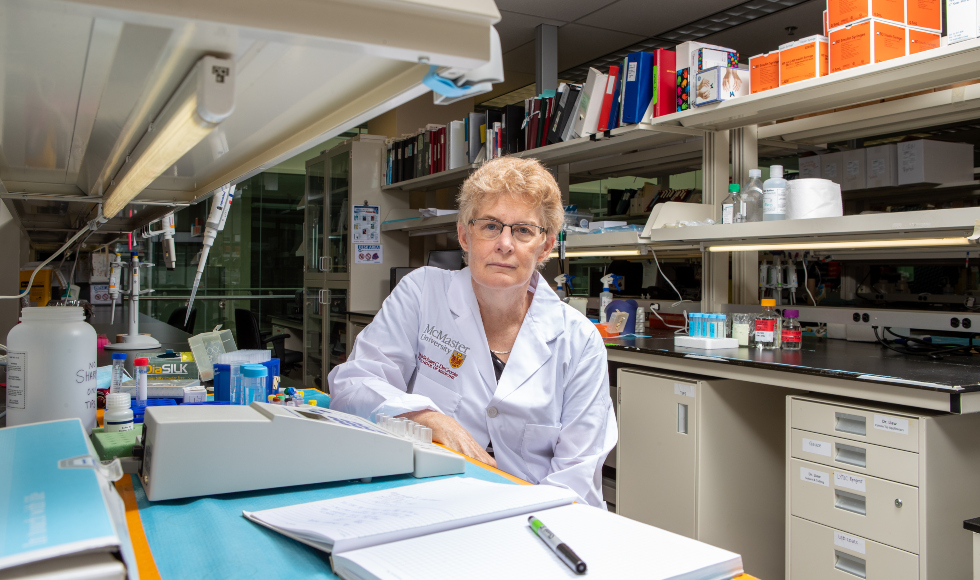McMaster heads network to study deadly blood infections

Alison Fox-Robichaid is the new scientific director of Sepsis Canada. Photo by Georgia Kirkos
July 23, 2020
A new McMaster University-based network will bring together researchers and patients to tackle sepsis—a leading cause of death in COVID-19.
Sepsis is a life-threatening condition that results from an out-of-control immune response to an infection that may lead to tissue damage, organ failure and death. Children, seniors, those with chronic health conditions like diabetes, cancer or immunodeficiency, and members of certain groups such as Indigenous Peoples, new immigrants to Canada and those with unstable housing are especially vulnerable to sepsis.
The source of infection in sepsis can be a microbial pathogen such as a virus or bacterium. The new coronavirus that causes COVID-19 is now on the list of pathogens that cause sepsis. Most patients who are critically ill with COVID-19 develop sepsis, which becomes a major threat to their survival.
Hamilton MP Filomena Tassi today announced an investment of $5.7 million by the federal government, through the Canadian Institutes of Health Research (CIHR), to support Sepsis Canada. The new national research network will bring together 190 clinicians, scientists, and patient representatives from across the country to improve the treatment and recovery of sepsis patients.
McMaster professor of medicine Alison Fox-Robichaud is the scientific director of the new network.
“Canadians should be aware that sepsis, the life-threatening response to an infection, is a global health issue and never is this more apparent than during the current pandemic,” she said.
“Our team of scientists, knowledge users, patient and family members and partners are prepared to change the story within our country.
“We will do this by better understanding the epidemiological and financial burden of sepsis in Canada, by understanding and improving the long-term outcomes of sepsis survivors, by creating a culture of sepsis awareness in Canada, by working to assure standardized practices for sepsis surveillance, detection and prevention, by improving the understanding the complex interactions between predisposing conditions, the infections that cause sepsis and the response to those infections and by discovering new evidence-based cost-effective therapies.”
Sepsis Canada will track and study treatments for septic patients and develop a bank of evidence-based tools to educate the public and health care professionals about how to best prevent, diagnose and manage sepsis. The network will also collect data that will give a true understanding of the burden of sepsis in Canada. A recent global report published in the journal Lancet estimated that 75,000 cases of sepsis occur in Canada every year, likely causing 18,000 deaths.
Given the association between sepsis and severe COVID-19 infection, many members of the network are participating in COVID-19 research projects including developing diagnostic tools to predict the severity of disease; determining how hospital systems could be better organized to care for patients understanding and manage the effects of restricted visitation policies on the families and healthcare providers of critically ill patients, and a clinical trial to determine the effectiveness of vitamin C as a treatment for sepsis, including sepsis in COVID-19 patients.
The results of these projects and others will be shared throughout the network and help improve the treatment of patients with severe COVID-19 infection leading to sepsis.
In a message as part of the network launch, Minister of Health Patty Hajdu, said, “The importance of understanding how to track and treat sepsis has never been as important as it is now. We are proud to help bring together this impressive group of clinicians, researchers, and patients from across the country. They will collaborate to produce knowledge that will improve the health of Canadians and contribute to a more sustainable health care system.”
Tassi praised the scientific director, saying, “McMaster University is home to some of Canada’s best researchers. As a researcher and professor at McMaster and a critical care specialist at Hamilton Health Sciences, Dr. Fox-Robichaud has become a scientific leader and passionate advocate for the sepsis community and ensured exceptional care for people living in our community. By working with her colleagues and partners in this new national initiative, she will improve the lives of many Canadians and their families.”


